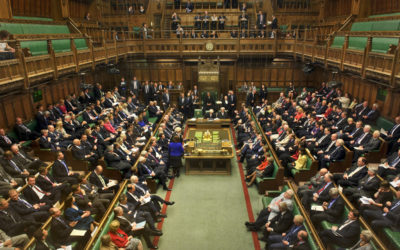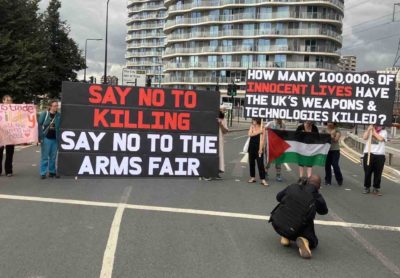#GE2017: info & questions for candidates
ForcesWatch comment
Defence and security: a quick comparison
The manifestos cover a range of analysis on defence and security – from a traditional focus on ‘strong defence’ and responding to problems with military action, to a more complex understanding of long-term security and the importance of a wide spectrum of preventative measures. They generally state a commitment to fairness for service personnel and veterans, in terms of welfare and services, but some risk over-promotion of the military. Most commit to maintaining or increasing military spending but not necessarily to looking at how money for defence is spent. All mention Trident, some mention the arms trade – see more below on whether parties are prepared to take an ethical view on them.
Much of the difference in the approach of the parties can be discerned in the detail and the language used, so do take a look at the manifestos themselves. The issues that we focus on at ForcesWatch aren’t given a mention but this is an opportunity to raise the profile of the military’s involvment in education and raising the age of recruitment to 18 – see below on questions to ask your candidates.
Find your local candidates and their contact details on Who Can I Vote For. This website is updated with candidate details all the time, so please check back regularly.
The Conservative Party promises ‘strong defence’ for a world ‘riven by conflict, terrorism and threat’. There is no analysis of root causes or alternatives to military might in dealing with conflict, or to long-term preventative measures. They promise to renew Trident and to meet ‘our NATO target of at least 2 per cent of GDP and increasing spending by at least half a per cent more than inflation every year.’ The Conservatives have gone much further than other parties who are want to continue with the use of Trident. Defence Secretary Michael Fallon stated very recently that, “In the most extreme circumstances, we have made it very clear that you can’t rule out the use of nuclear weapons as a first strike.”
The Labour Party also support maintaining a high level of defence spending, ‘at least 2 per cent of GDP’ and the renewal of the Trident, but they do commit to, ‘fulfil our obligations under the Nuclear Non Proliferation Treaty…(and)… lead multilateral efforts with international partners and the UN to create a nuclear-free world.’ They also state that, ‘Britain’s foreign policy should be guided by the values of peace, universal rights and international law.’
They also promise to, ‘implement the Arms Trade Treaty to a consistently high standard, including ceasing arms exports to countries where there is concern that they will be used to violate international humanitarian law (IHL)’. They state that they will, ‘demand a comprehensive, independent, UN-led investigation into alleged violations of IHL in Yemen, including air strikes on civilians by the Saudi-led coalition. We will immediately suspend any further arms sales for use in the conflict until that investigation is concluded.’
Labour also promises a complete strategic defence and security review when it comes into office. Read Jeremy Corbyn’s speech on terrorism and foreign policy.
The Liberal Democrats also agree to arms exports controls and to suspend arms sales to Saudi Arabia. Their manifesto for ‘peace and security across the world’ acknowledges how issues are interlinked and complex; they state that they would, ‘Champion the rules-based international order, which provides a strong basis for multilateral action to address the world’s most pernicious problems, including poverty, armed conflict, disease, climate change and the abuse of human rights, including forced marriage, so-called ‘honour’ killings, and female genital mutilation.’
On the use of military action the Lib Dems state that they, ‘Support the UN principle of Responsibility to Protect, focusing on conflict prevention and only resorting to military intervention to prevent mass civilian atrocities if all other means of resolution have been fully exhausted.’ They would, however, also maintain 2% spending on military and a minimum nuclear deterrant, but would not renew Trident and would ‘work to lead international nuclear disarmament efforts’.
The Green Party pledges ‘An ethical foreign policy that builds capacity for conflict resolution, and ends support for aggressive wars of intervention. No more arms sales to oppressive regimes.’ They promise to cancel Trident and emphasis a holistic perspecitve that would focus on long-term security: ‘We would co-operate with our neighbours on the shared challenges that face us all – from tackling terrorism and preventing climate change, to reducing inequality. We would work towards an outward-facing Britain that has the confidence and resilience to welcome others.’
Plaid Cymru opposes ‘unnecessary, undemocratic and ill-considered military action’ and to oppose military action without UN and parliamentary approval and to scrap Trident, ‘resisting any attempts to relocate it to Wales. We will instead invest in home-based troops and strengthen our conventional forces.’
The SNP have yet to publish their manifesto but its policies can be read here, including that they ‘will never support the renewal of Trident’.
The UKIP manifesto states that it, ‘will avoid allowing Britain to become embroiled in foreign wars’ although a significant emphasis is placed upon increasing defence spending and ‘will retain Britain’s independent nuclear deterrent’. They state that they will ‘restore Britain’s armed forces to their rightful place among the most professional, flexible and effective fighting forces in the world, and we will sign a new military covenant with our brave heroes.’
More information
There two articles provide useful background to our current security context and remind us that Britian is at war in a number of parts of the world, although this goes almost unrecognised in terms of media coverage or parliamentary and public debate.
The wrongs of counter-violence by Professor Paul Rogers, Bradford University
UK General Election: What are the foreign policy implications? By Mark Curtis, historian and analyst of UK foreign policy and international development.
Watch the Pre-election Defence Debate (22/5/2017) which touches on wider security approaches but, given the audience, is quite focused on operational policies.
.
Arms trade versus human rights
Check out this quick comparison of election manifestos from Campaign Against the Arms Trade. Ask your candidates whether they support the arms trade as it is, or if they support greater controls on exports, particularly to countries violating human rights, and a move away from economic dependence on the defence industry.
Trident
CND is asking candidates for their views on three key issues during General Election 2017.
- The UK signing the UN nuclear ban treaty
- The replacement of Trident
- The construction of new nuclear power stations
We need to talk about security
One of the concerns ForcesWatch has about increasing military influence on society and education, is that it stifles critical, nuanced and open debate about sustainable security.
Two resources about sustainable and ethical security have been produced by the Ammerdown Group, a network of peace and security experts whose Rethinking Security project aims to ‘develop a fresh approach to security which is grounded in the well-being of people and planet, and rooted in solidarity, justice and respect for our interdependence.’
1. #GE2017 We need to talk about security: a 2 minute film with 3 key security questions for all political parties:
- What kinds of insecurity do you think most affects people’s daily lives?
- How could the UK respond better to causes of global insecurity such as inequality, climate change and military conflict?
- What principles should underpin the UK’s international security alliances?
2. A parliamentary briefing on security policy: a short briefing highlighting six key issues for long-term, democratic security.
Questions on challenging the promotion of the military
Quakers in Britain have produced resources for #GE2017 on a wide range of issues. These include militarism in schools and what the UK should be doing to promote peace instead of the military:
Questions for candidates on militarisation in schools
- The UN Committee on the Rights of the Child has called for more conflict resolution to be taught in UK schools. What will you do to bring conflict resolution education to all our schools?
- The armed forces are playing an increasingly large role in education (e.g. the spread of cadet forces to state schools, involvement in teaching STEM, University Technical Colleges sponsored by the military). How will you ensure schools receive guidance regarding military involvement in order to ensure balance and the encouragement of critical thinking?
- Why is Britain the only country in Europe to recruit 16-year-olds into its armed forces? If elected will you add your support to the widespread call for raising the minimum age of enlistment to 18?
Questions for candidates on international conflict and peace
- Do you think UK taxpayers should be subsidising the production and sale of British-made weapons to other countries to the tune of £700 million a year?
- Do you think the UK should comply with international law or does it have the right to bomb or send its armed forces into other countries without express authorisation from the UN Security Council?
- Do you think we as a country should be spending nearly £40 billion a year on the military when we could be spending it on the NHS, schools, and other public services?
Do your candidates agree that the minimum age of armed forces recruitment should be raised to 18?
The Green Party are currently the only party whose policy includes raising the age of armed forces recruitment to 18 years old (see their Peace & Defence policy).
Ask your candidates:
- Support is widespread for raising the enlistment age to 18 – this would safeguard more effectively the rights, welfare, and long-term outcomes of young people. Do you agree?
- A recent report by the public health charity Medact found evidence that recruiting children aged 16 and 17 into the British army places them at greater risk of death, injury and long-term mental health problems than those recruited as adults. Do you find that acceptable or think that the age of armed forces recruitment should be raised?
See more: legislation & policy, election
Like what you read?
> Sign up for our newsletter or blog notifications
> Support our work – from just £2 a month









